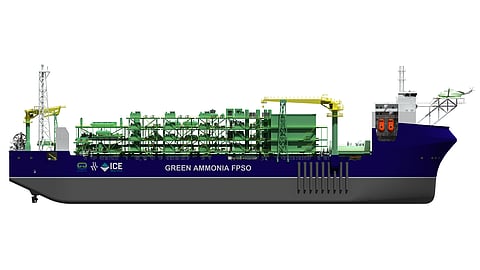ABB Powers the Future of Clean Marine Energy with Floating Green Ammonia Facility
In a bold leap toward a carbon-neutral maritime future, ABB has entered into a landmark term sheet agreement with SwitcH2 to deliver advanced automation and electrification technologies for the world’s first floating green ammonia production, storage and offloading (FPSO) vessel.
The collaboration will drive a paradigm shift in how sustainable fuels are produced and delivered offshore — accelerating the global transition to low-carbon marine energy.
A Floating Factory for the Future
Stationed off the coast of Portugal, the SwitcH2 FPSO will harness certified renewable electricity under Power Purchase Agreements from the national grid to power a 300 MW electrolyzer. The system will produce up to 243,000 tonnes of green ammonia annually, marking a significant milestone in clean energy innovation.
The vessel will produce green hydrogen from seawater electrolysis, then combine it with nitrogen extracted from the air to synthesize green ammonia — a clean, storable, and transportable fuel.
Once produced, the ammonia will be condensed, stored onboard, and offloaded via a floating hose system for use in global ports — either as a marine fuel or reconverted into hydrogen for industrial applications.
ABB’s Technology at the Core
Under the agreement, ABB will engineer and supply a prefabricated eHouse, electrical distribution systems, and its flagship ABB Ability™ System 800xA® Integrated Control and Safety System (ICSS) — ensuring complete automation, safety, and cyber-secure operations at sea.
These modular, ready-to-deploy systems will fully integrate with third-party components, including electrolyzers and ammonia synthesis units, allowing for streamlined, efficient production and seamless digital control.
“This collaboration represents a key step in advancing offshore production capabilities for next-generation marine fuels,” said Saskia Kunst, CEO of SwitcH2. “By integrating ABB’s advanced electrification and automation systems, we are demonstrating how technology-driven partnerships can accelerate innovation, shaping the future of energy at sea.”
Decarbonizing the Maritime Sector
Shipping currently accounts for around 2% of global greenhouse gas emissions, according to the International Energy Agency (IEA). As international regulations tighten, green ammonia is emerging as one of the most promising zero-carbon fuel alternatives capable of powering large vessels without fossil fuels.
“Our mission is to help industries operate leaner and cleaner,” said Per Erik Holsten, President of ABB’s Energy Industries division. “With this project, we are showcasing how renewable energy can be leveraged to unlock sustainable energy value chains. Green ammonia is not just an idea — it’s a viable pathway to decarbonize marine transport.”
Engineering the Future Timeline
The project’s Front-End Engineering and Design (FEED) phase will continue through mid-2026, with a Final Investment Decision (FID) expected in the third quarter of 2026. Full-scale engineering, construction, and deployment are scheduled to begin in 2027.


